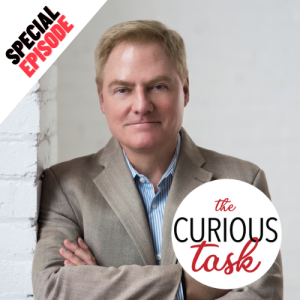
In Special Episode 2's celebration of 100 episodes, Curious Task producer Sabine El-Chidiac pointed to Episode 67 with Tom Palmer as one of her favourites, so we're re-releasing it! In this episode, Tom Palmer talks about the institutions and conditions that cause peace and war, and why the concept of war might be closer to home than some might think. If you haven't had a chance to listen to it before, we hope you find it interesting. If you have, enjoy its re-release!
References from The Curious Task Special Episode 4 with Tom Palmer
- Tom Palmer’s book, Realizing Freedom: Libertarian Theory, History, and Practice can be purchased on Amazon Canada at this link.
- Tom has additionally wrote and/or edited the following works:
The Morality of Capitalism: What Your Professors Won't Tell You (link)
After the Welfare State (link)
Why Liberty (link)
Self-Control or State Control? You Decide (link)
Peace, Love, and Liberty - the basis of this episode from which many of quotes, interview references, and military case studies were selected (link)
Dignity and Democracy with co-author Matt Warner (publication coming out next year) - Erik Gartzke found that trading countries are less likely to war in his article, The Capitalist Peace, which is available online.
- Tom’s Interview with a Businessman for Peace with Chris Rufer on peacemaking in business and trade, appears in Chapter 4 of Peace, Love, and Liberty.
- Frédéric Bastiat’s was an economist and peace advocate who argued the costs of long-term consumption from tax-produced weaponry in his book, That Which Is Seen, and That Which Is Not Seen, which can be read on the Mises Institute’s website.
- Robert Higgs’ article, Wartime Prosperity? A Reassessment of the U.S. Economy in the 1940s, (featured in The Journal of Economic History) clarified how productive efforts in jeeps and vans shipped to other countries do not constitute economic benefit due to the lack of private vehicle production. This article can be accessed here through an active JSTOR account or your educational institution.
- Tom’s essay, Peace is a Choice, presents a case study on political science professor and former US government official Madeline Albright and her view of the exemplary nation and how professors have a tendency to think about wars differently than those who have witnessed them. This is a chapter in Peace, Love, and Liberty.
- A transcript of Colin Powell’s infamous 2003 speech to the United Nations on the disarmament of Iraq which touches on themes of human lives and consequence can be read on The Washington Post archives.
- Tom’s recommended two German novels of the Great War to enrich an understanding of war from different perspectives on anguish and glory, respectively: All Quiet on the Western Front by Erich M. Remarque (link) and Storm of Steel by Ernst Junger (link).
- Parker Thomas Moon’s book, Imperialism and World Politics, highlights the devaluation of important political science questions when personal pronouns are employed during conflict. This book is available on Google Books at this link.
- Joshua Greene’s book discussing our psychological propensities to cooperate and designate teams to destroy other groups, Moral Tribes: Emotion, Reason, and the Gap Between Us and Them is available on Amazon Canada for purchase here.
- Robert Musil’s book, The Man Without Qualities, explores how a nation exists to offset responsibilities without remorse and is available for purchase on Amazon at this link.
- Samuel P. Huntington’s study, The Clash of Civilizations?, noting how much territory is under military control can be viewed at this link through an active JSTOR or partner institution account.
- Tom cites Carl Schmitt and his theory on the irreconcilibity of conflicts as a foundation for solidarity in the podcast. An overview of Schmitt’s essential works was published by John P. McCormick from the University of Chicago in the Annual Review of Political Science at this link.
- Chapter Five of Aristotle’s Nicomachean Ethics, covering the types of friendships human beings can have, was briefly mentioned on the podcast and can be read at this link courtesy of McMaster University’s Faculty of Social Sciences.
- Ernesto Laclau emphasizes the importance of identifying the enemy for successful populist rhetoric in his book, On Populist Reason, available on Amazon Canada here.
- George Orwell’s essay on how language can be operationalized to “obscure pure violence,” Politics and the English Language, can be accessed online at this link.
More Episodes
Adam Gurri - What ls Mere Liberalism?
 2022-02-09
2022-02-09
 2022-02-09
2022-02-09
Dan Shahar - Is It Okay To Eat Meat?
 2022-01-19
2022-01-19
 2022-01-19
2022-01-19
Tony Gill - Why Do We Give Gifts?
 2021-12-22
2021-12-22
 2021-12-22
2021-12-22
Bill Glod - Is It Okay To Make Bad Choices?
 2021-12-08
2021-12-08
 2021-12-08
2021-12-08
Gary Chartier - Do Markets Need Capitalism?
 2021-12-01
2021-12-01
 2021-12-01
2021-12-01
Ben Klutsey - How Do We Bridge Divides?
 2021-11-24
2021-11-24
 2021-11-24
2021-11-24
Geoff Kellow - Do Markets Promote Virtue?
 2021-11-10
2021-11-10
 2021-11-10
2021-11-10
012345678910111213141516171819
Create your
podcast in
minutes
- Full-featured podcast site
- Unlimited storage and bandwidth
- Comprehensive podcast stats
- Distribute to Apple Podcasts, Spotify, and more
- Make money with your podcast
It is Free
- Privacy Policy
- Cookie Policy
- Terms of Use
- Consent Preferences
- Copyright © 2015-2024 Podbean.com






